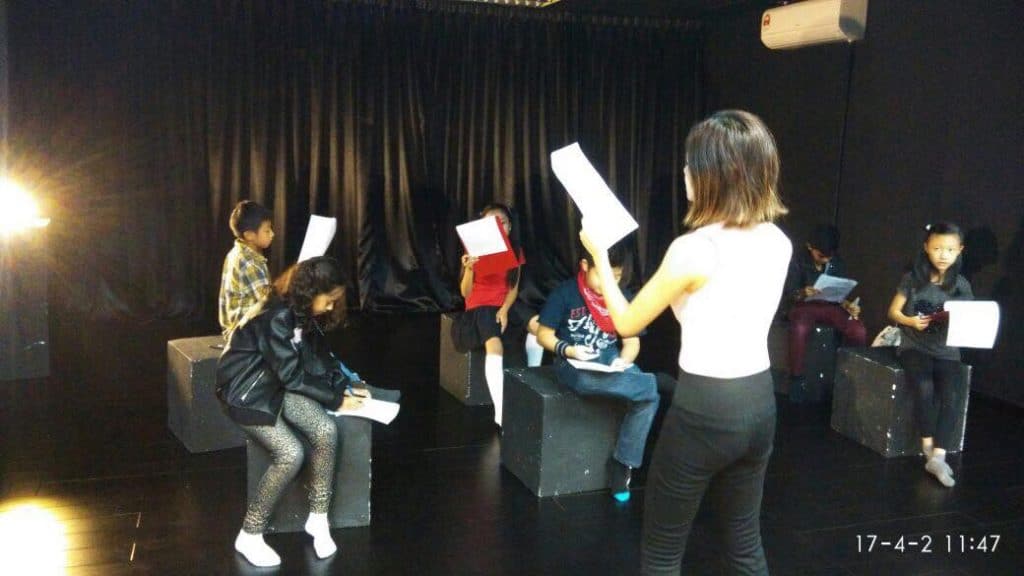Speech & Drama Lessons and Acting Training for Kids, Teens and Adults
Speech and Drama
Speech and drama lessons teach skills that allow students to communicate, to be creative, and to have a grounded sense of self-confidence through a wide range of topics such as role play, story telling, fun theater games, speaking and presentation skills. Such activities in speech and drama class cultivates the following knowledge and values:
Conversation skills
Drama skills
Positive body language
Positive interaction with peers and adults
Public speaking skills
Harness creativity
Speech & drama lessons are taught in smaller groups because the content tend to lean towards more individualized and personalized teaching styles. Acting skills are taught as a secondary and complementary set of skills in Speech and Drama. Students don’t normally put on a big performance at the end of the year. Their ‘performance’ experience happens each week in front of their peers in the classroom, or in a form of a small group showcase every few months. Usually at the end of the year, the focus is often on gaining their next grade of external qualification.
Speech & drama lessons can allow students to form close relationships with their teachers and peers in their small classes. Classes are highly engaging and interactive, students are often allowed to discuss opinions and ideas with the teachers and this helps promote critical thinking and listening ability. Like any other performing arts class, Speech and drama lessons also instill a sense of achievement as students work towards presentations and acquire internationally recognised speech & drama qualifications.
Acting
Acting involves a broad range of skills, including a well-developed imagination, emotional facility, physical expressiveness, vocal projection, clarity of speech, and the ability to interpret drama. Acting also demands an ability to employ, improvisation, observation and emulation, mime, and stage combat. Acting training usually involves many instructors and teachers for a full range of training depending on the topics and the needs of a performance.
All the above training can over time build confidence in communication ability. Another valuable trait that acting classes are able to groom is the ability to imagine what someone else might be thinking or feeling. This ability, also known as Empathy, is crucial in today’s globalized world. Understanding perspectives different from one’s own helps develop effective communication. Empathy is a trait that can be actively built and practiced to enhance interpersonal skills and in turn positively improve many personal and work aspects of life overtime.
Content you will learn include:
- Vocal Projections and Pronunciation (Able to speak loud and clear)
- Theater Games (Build mind and body focus, teamwork and communication basics)
- Stage Directions and Terms. (Terms for instructions in class)
- Script Analysis and Character Research (Promotes Critical Thinking and Perspective Taking)
- Mime and Mime with Music (Emotion and body language literacy)
- Various Acting Methods (Variety of methods to be in the shoes of your character)
- Monologue and Prose (Solo Performance and Speech Expressions)
- Open Scenes and Scriptwork (For live drama performance and acting for camera)
Advantage of learning with us
- Our acting class will expose students to a number of different instructors specialize in different skills. This allows them to be exposed to different teaching and learning styles.
- Methods that promote cognitive empathy such as Handling Criticism, Perspective Taking, Emotional Literacy and many more are constantly embedded in their activities to cultivate their interpersonal skills. Once a student reaches a certain level of proficiency in acting, they can be taught to apply cognitive empathy for daily communication uses.
- Our acting class content covers a diverse range of themes. Research and critical thinking is crucial in interpreting the play. This further allows students to improve their awareness and understanding of perspectives in culture and history different from their own.
- Students usually work towards a year end show where students are required to work with a large group consisting of fellow students, show directors and technical crews. This experience will enable students to improve their interpersonal skills tremendously as they are required to problem solve, think on their feet and most importantly work as a team.
Learning acting brings many practical benefits to one’s growth especially when the world becomes increasingly interconnected. The skills are useful not just for entertainment but also for more daily practical purposes.
Speech and Drama and Acting Class Area of Focus

- Focus and Creativity
- Speech and Vocal Training
- Acting Methods and Skills
- Empathy
- Communication Skills
- Creativity
- Teamwork
- Critical Thinking